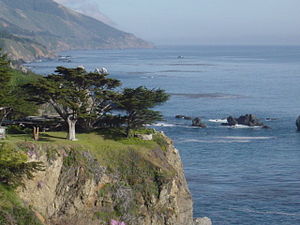The Edge of the Earth: A Novel
Christina Schwarz
Atria Books (April 2013), hardcover (ISBN 1451683677 / 9781451683677)
Fiction (historical), 288 pages
Source: ARC from publisher
Reason for reading: Intended for review in Shelf Awareness for Readers, but didn’t finish reading the book in time to meet my deadline
Opening Lines, from the Prologue: “I’m not going to let on I was born here. People always ask what it was like to grow up in a lighthouse, and then they’re disappointed by the answer. I’m not much of a storyteller. Anyway, growing up in a lighthouse isn’t all that remarkable when you don’t know anything different, and I didn’t know anything different until I left Point Lucia at nineteen.”
Book Description, from the publisher’s website
In 1898, a woman forsakes the comfort of home and family for a love that takes her to a remote lighthouse on the wild coast of California. What she finds at the edge of the earth, hidden between the sea and the fog, will change her life irrevocably.
Trudy, who can argue Kant over dinner and play a respectable portion of Mozart’s Serenade in G major, has been raised to marry her childhood friend and assume a life of bourgeois comfort in Milwaukee. She knows she should be pleased, but she’s restless instead, yearning for something she lacks even the vocabulary to articulate. When she falls in love with enigmatic and ambitious Oskar, she believes she’s found her escape from the banality of her preordained life.
But escape turns out to be more fraught than Trudy had imagined. Alienated from family and friends, the couple moves across the country to take a job at a lighthouse at Point Lucia, California—an unnervingly isolated outcropping, trapped between the ocean and hundreds of miles of inaccessible wilderness. There they meet the light station’s only inhabitants—the formidable and guarded Crawleys. In this unfamiliar place, Trudy will find that nothing is as she might have predicted, especially after she discovers what hides among the rocks.
| Big Sur, California (Photo credit: Wikipedia) |
Comments: There’s something romantic about the image of a lighthouse high on a cliff, casting its beam to guide sailors and protect ships from rough shorelines. However, the reality of keeping that light on was probably far more a matter of hard physical labor than romance, particularly before that lighthouse ran on electricity. Christina Schwarz’s historical novel, The Edge of the Earth, explores that reality along the Big Sur coast of California in the early years of the 20th century, building up the drama between the two families who keep the Point Lucia lighthouse without downplaying the work involved in what they do.
The life and work of a lighthouse keeper wasn’t one that Trudy envisioned for herself as the educated only daughter of a prosperous Milwaukee family, but falling in love with Oskar Swann–the cousin of the man she’s expected to marry–is just the first step toward that unexpected life. Adjusting to the isolation of the Point Lucia lighthouse–the Swanns and the other lighthouse family, the Crawleys, may see no one but each other for months on end–is a challenge for the socially-inclined Trudy. However, the scientific bent of her mind is engaged by her new natural surroundings. Other aspects of her curiosity are stirred by the sense that the Crawleys have secrets, but the physical and emotional energies involved in starting a marriage and a demanding job at the same time and in a strange place at times keep her from exploring either of those interests.
Like her protagonist, Schwarz’s interests as a novelist also seem pretty diverse here: history, natural science, relationship and emotional drama, anthropology, and more than a little seasoning of Gothic mystery. With all of these elements packed into under 300 pages and a plot that seemed to change direction several times, The Edge of the Earth felt both overstuffed and underdeveloped to me–and sometimes, both at once–but it thoroughly held my attention. Trudy’s appeal as a protagonist and narrator was a big factor in that, and so were the well-chosen details that Schwarz chose to depict her world, establishing a distinctive sense of time and place that anchors the novel.
I wasn’t entirely satisfied with The Edge of the Earth because I’m not sure exactly what it’s trying to do, as a novel. It’s too brief and too meandering to be epic, but at times it feels like it wants to be. It’s an intriguing look at an unfamiliar piece of California history through the eyes of a woman a little ahead of her time, and I’d have liked more of that–with a little less of the family-secrets melodrama.








